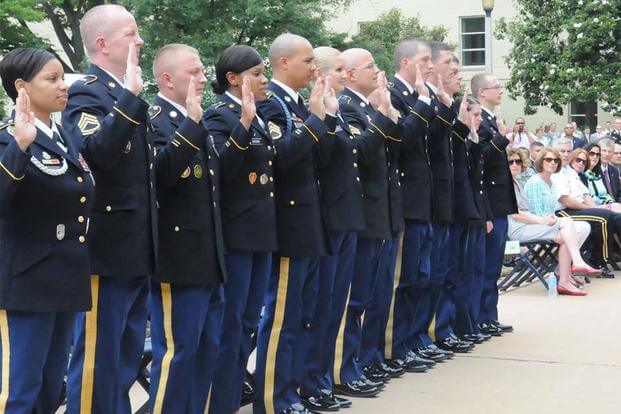The surprise felt by many Americans the day after the presidential election was noticeable at the Pentagon, where U.S. service members said they never expected Donald Trump would become their new commander-in-chief.
"I stayed up until about 1:30 in the morning, and I couldn't believe it," said Air Force Maj. Todd Watson, a 42-year-old programs manager at the Defense Department.
He said he voted for Trump, despite the candidate's "rough-around-the-edges" image.
"A lot of times what he said concerned me, and I thought he would have had a better time if he would have used a different tact," Watson said. "I was bothered by a lot of the same stuff most folks were put off by, but at the end of the day, I don't know if the lesser of two evils was the right terminology ... but it was a vote against Hillary Clinton."
With Clinton, "there was a trust thing," Watson said, who described Trump as "an outsider who will try to inject something different into the system."
He added, "There may be some pain with that, but I think it will be a positive thing in many ways too."
About a dozen service members said they didn't feel comfortable talking to a reporter about the election. Half of those were female service members.
A U.S. Navy officer, who asked not to be identified, said he was very surprised by the election's outcome.
"It was kind of shocking. It just seemed like by all the polls that were coming out; everybody seemed to be saying Clinton was a shoo-in," he said, adding, "I didn't vote for either one of them."
The personnel policy specialist with 19 years of service said he voted instead for Gary Johnson, the libertarian candidate.
"I wasn't impressed with some of the things I was hearing about Hillary Clinton," he said, referring to the FBI investigation into her emails as secretary of state.
As for Trump, "some of his personal actions were very concerning," such as the negative comments he made about women.
"A lot of it just didn't seem very presidential," he said.
He said he hasn't been this surprised by a national event since the O.J. Simpson murder trial verdict.
"Everybody just assumed he was guilty and the verdict came back as not guilty, and everybody was just flabbergasted," he said. "I kind of get the feeling that a lot of people had the same reaction this morning."
The naval officer admitted that he was concerned that "the whole election process was a foregone conclusion," since the "powers that be," the news media and social media, all seemed to be pushing Clinton forward to victory.
"The whole thing just seemed like it was a set-up," he said.
When Trump won, he said he said it was very "refreshing to see Americans make a decision like that."
"Maybe all this was just conspiracy thoughts on my own part."
Army Master Sgt. Pernell Sato said he also didn't think Trump would win.
The 52-year-old paralegal on Active Guard Reserve status said he did not vote this time.
"I couldn't decide," Sato said. "I just didn't want to do it just for the sake of doing it. I wasn't really against or for either of them."
Sato said he was curious as to how much of a difference "an outsider can make. Maybe that's what the country wanted."
"If it shakes up things a little, it could be possibly good or it could be a disaster," he said. "We have survived disasters."
In September, Trump proposed an almost Reaganesque plan to boost the size of the military.
He called for increasing the size of the Army to about 540,000 active-duty soldiers, the Marine Corps to 36 battalions, the Navy to 350 surface ships and submarines, and the Air Force to at least 1,200 fighter aircraft.
By comparison, the Pentagon's $583 billion budget proposal for fiscal 2017, which began Oct. 1, requests funding for 460,000 active soldiers, 24 Marine infantry battalions, 287 naval ships and roughly 1,170 fighter aircraft (excluding A-10 ground attack aircraft) -- all for the active component. The figures don't take into account additional troops and equipment for the Guard and Reserve.
Trump didn't specify how he would work with Congress to fund such a plan, which would cost, at minimum, tens of billions of dollars.
Watson said he has "mixed emotions about whether I think somebody can achieve all of that."
"I think a person like an elected official comes in with all these grand notions about what they are going to get done, and I think they have to temper it once they are in there because they have the realization that it is going to be a much larger challenge that they anticipated," Watson said.
"I guess my take on a lot of this is: I don't know how any one entity, Republican or Democrat, can move the ball forward, but I do feel like there is a hope of perhaps doing some of those things under a presidency with him at the helm.
"I think a guy like Trump is going to work hard and get darn close ... My hope is he can do a lot of what he says he is going to do," he said.
One Army officer, who also asked not to be identified in this story, said he thinks any president could make such changes to the military "if they had the support of the people and the Congress."
"I have been a proud member of the Army for 23 years, an organization that has been around for 241 years," he said. "Regardless if we get bigger, smaller, whatever the future may hold for us, we are still going to be here for the American people."
While he wouldn't say who he voted for, the Army officer said "there is nothing but opportunities ahead of us right now."
-- Matthew Cox can be reached at matthew.cox@military.com.
Don't Miss a Single Military.com Story
To read the full article and get exclusive benefits, sign up today.
It’s FREE
Why am I seeing this? Visit our FAQs
























